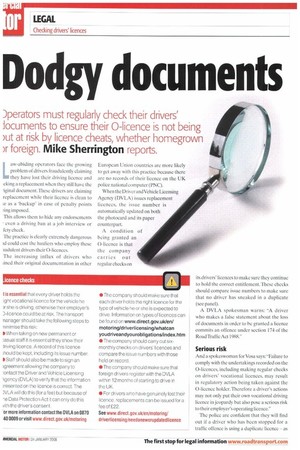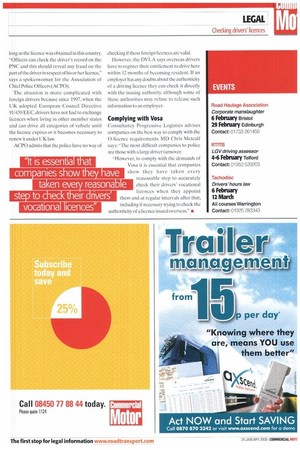Dodgy documents
Page 28

Page 29

If you've noticed an error in this article please click here to report it so we can fix it.
Dperators must regularly check their drivers' locuments to ensure their 0-licence is not being )ut at risk by licence cheats, whether homegrown )r foreign. Mike Sherrington reports.
Law-abiding operators face the growing problem of drivers fraudulently claiming they have lost their driving licence and eking a replacement when they still have the iginal document.These drivers are claiming replacement while their licence is clean to ;e as a 'backup' in case of penalty points :ing imposed.
This allows them to hide any endorsements even a driving ban at a job interview or fety check.
The practice is clearly extremely dangerous id could cost the hauliers who employ these ludulent drivers their 0-licences.
The increasing influx of drivers who tined their original documentation in other European Union countries are more likely to get away with this practice because there are no records of their licence on the UK police national computer (PNC).
When the Driver and Vehicle Licensing Agency (DVLA) issues replacement licences, the issue number is automatically updated on both the photocard and its paper counterpart.
A condition of being granted an 0-licence is that the company carries out regular checks on its drivers' licences to make sure they continue to hold the correct entitlement. These checks should compare issue numbers to make sure that no driver has sneaked in a duplicate (see panel).
A DVLA spokesman warns: -A driver who makes a false statement about the loss of documents in order to be granted a licence commits an offence under section 174 of the Road Traffic Act 1988.
Serious risk
And a spokeswoman for Vosa says: Failure to comply with the undertakings recorded on the 0-licences, including making regular checks on drivers' vocational licences, may result in regulatory action being taken against the 0-licence holder. Therefore a driver's actions may not only put their own vocational driving licence in jeopardy but also pose a serious risk to their employer's operating licence."
The police are confident that they will find out if a driver who has been stopped for a traffic offence is using a duplicate licence — as long as the licence was obtained in this country. "Officers can check the driver's record on the PNC and this should reveal any fraud on the part of the driver in respect of his or her licence," says a spokeswoman for the Association of Chief Police Officers (ACP0).
The situation is more complicated with foreign drivers because since 1997, when the UK adopted European Council Directive 91/439/EEC, drivers have not had to exchange licences when living in other member states and can drive all categories of vehicle until the licence expires or it becomes necessary to renew it under I.3K law.
ACP0 admits that the police have no way of checking if these foreign licences are valid.
However, the DVLA says overseas drivers have to register their entitlement to drive here within 12 months of becoming resident. If an employer has any doubts about the authenticity of a driving licence they can check i directly with the issuing authority, although some of these authorities may refuse to release such information to an employer.
Complying with Vosa Consul [alley Progressive Logistics advises companies on the best way to comply with the 0-licence requirements. MD Chris Metcalf says: -The most difficult companies to police are those with a large driver turnover.
"However, to comply with the demands of Vosa it is essential that companies show they have taken every reasonable step to accurately check their drivers' vocational licences when they appoint them and at regular intervals after that, including if necessary trying to check the authenticity of a licence issued overseas" •








































































































































































